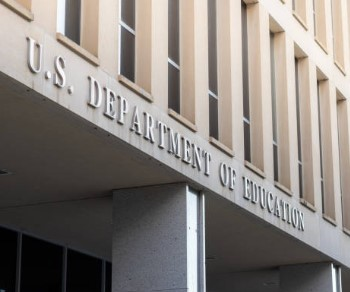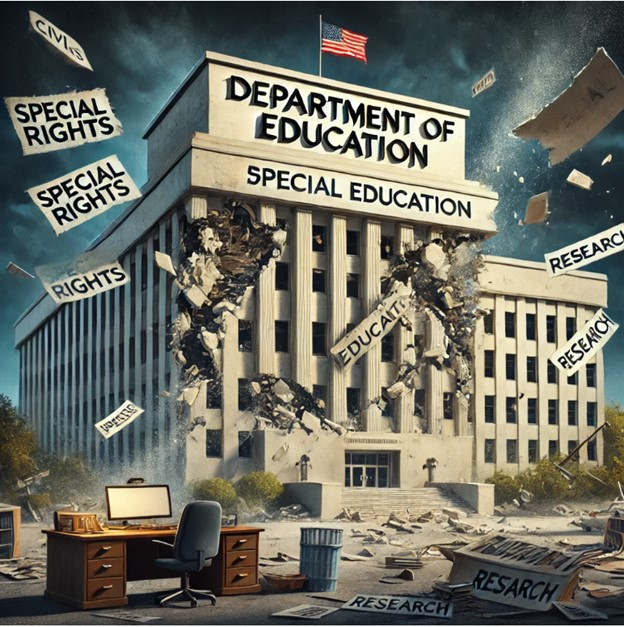The Future of Learning: How Trump's Policies Threaten the Dismantling of American Education
Input
Modified
The Federal Overhaul: Reshaping the Department of Education The Department of Education's Demise: Short-Term Benefits, Long-Term Consequences The Rise of Educational Authoritarianism and State Control

The Federal Overhaul: Reshaping the Department of Education
The Trump administration has implemented unprecedented reforms to the U.S. Department of Education (DOE). These reforms are not only redefining the role of federal oversight in education but also significantly reducing resources that support civil rights, special education, and research. Linda McMahon, who has no prior experience in public education, announced nearly 1,300 reductions less than two weeks into her tenure as Secretary of Education. Her objective was to eliminate "bureaucratic bloat." The administration asserts that these cuts will assist in the redistribution of funds to states; however, critics contend that they represent the commencement of an era of educational authoritarianism that will have catastrophic repercussions for the future workforce of America, students, and teachers.
The reinterpretation of Title VI of the 1964 Civil Rights Act, which previously prohibited racial discrimination in federally funded programs, has been one of the most alarming policy shifts. The Trump administration's revised definition now encompasses purported discrimination against white individuals, thereby redefining civil rights laws in a manner that could potentially stifle discourse regarding systemic racism in educational institutions. McMahon's leadership has resulted in substantial budget reductions for the Office for Civil Rights, which is responsible for ensuring that schools adhere to federal anti-discrimination legislation. Consequently, it is anticipated that a significant number of pupils and families will be deprived of legal recourse, contributing to the accumulation of civil rights complaints.
Simultaneously, Trump's executive orders have targeted "radical indoctrination" in schools, with an emphasis on the elimination of critical race theory, diversity, equity, and inclusion (DEI) initiatives, and discussions on gender identity. The Executive Order 14190, which is entitled "Ending Radical Indoctrination in K-12 Schooling," poses a threat to reduce funding for educational institutions that are discovered to be promoting what his administration deems to be "anti-American" teachings. Another example of the administration's efforts to control educational content is the reinstatement of the 1776 Commission, which promotes a patriotic, sanitized version of U.S. history. This move removes critical discussions of racism, gender, and social justice from the classroom.
Experts caution that these measures will have the opposite effect, resulting in confusion, legal disputes, and a deterrent effect on educators and institutions who are apprehensive about the potential repercussions of teaching accurate historical narratives, despite the administration's assertions that they will enhance education and eliminate inefficiencies.

The Department of Education's Demise: Short-Term Benefits, Long-Term Consequences
Trump has frequently referred to the Department of Education as a "con job," contending that it is a bureaucracy that is ineffective and spends an excessive amount of money without achieving any results. However, the United States' global education rankings have continued to decline, despite the fact that it spends more per student than the majority of countries. Nevertheless, Trump's strategy appears to be directed toward the complete dissolution of the Department of Education, rather than the pursuit of targeted reforms to address these challenges.
The implications of Linda McMahon's substantial reductions to the Department of Energy are far-reaching. The National Center for Education Statistics (NCES), which is responsible for the collection of critical data that assists policymakers in the development of education funding and policy, has been completely dismantled. In the absence of this data, legislators will be compelled to make decisions based on political ideology rather than factual analysis, which will exacerbate disparities in education funding and access.
Furthermore, the reduction in research funding has had a significant impact on studies that aim to enhance educational outcomes, with a particular emphasis on students with disabilities. Special education research is instrumental in the creation of cutting-edge technologies, strategies, and instruments that facilitate the success of children with learning disabilities. In the long term, higher societal costs, such as lower employment rates and increased dependence on social assistance programs, may result from millions of children facing inadequate educational opportunities in the absence of ongoing investment in this field.
These reductions will have a significant impact on civil rights enforcement, which is a critical area. The Office for Civil Rights (OCR) will be unable to resolve cases involving racial discrimination, disability rights, and gender equality due to the reduction in staff. This could result in lawsuits against the government, which would impose a financial burden on taxpayers during the lengthy litigation process. In the past, rehiring efforts and legal battles were costly, further negating any intended cost-saving benefits, as a consequence of similar mass layoffs under the Trump administration.
An additional unintended consequence of these significant reductions is the departure of highly skilled personnel from the Department of Energy. The tumultuous and unstable work environment has resulted in the layoff of numerous experienced staff members or their decision to depart. Consequently, leadership positions may be occupied by individuals who lack the requisite expertise, resulting in additional inefficiencies. Ultimately, the quality of education policy and supervision will be compromised as a result of the DOE's challenges in attracting and retaining highly qualified professionals in the long term.

The Rise of Educational Authoritarianism and State Control
The primary objective of the Trump administration's education agenda is to establish state control over education. Advocates contend that decentralization will enable states to establish policies that are most appropriate for their local circumstances. Nevertheless, critics caution that the absence of federal oversight may result in the eroding of civil rights protections and the exacerbation of disparities between affluent and low-income school districts.
Title I funding, which provides federal support for low-income schools, would be eliminated by Trump's proposal, which would have catastrophic consequences for underfunded urban and rural districts. These institutions will encounter significant challenges in supplying fundamental resources in the absence of federal support, which will exacerbate educational inequality and restrict opportunities for students from marginalized backgrounds.
The Trump administration has advocated for "school choice" as a solution, which prioritizes private and charter schools over traditional public schools, in addition to undermining public education. Proponents of school choice contend that it enhances educational quality and increases competition. However, the reality is that voucher programs and charter school expansion frequently divert funding from public schools, leaving them with fewer resources to support students who require the most.
Academic freedom has also been a topic of concern as a result of the Trump administration's efforts to promote "patriotic education" and its assault on universities for purportedly promoting anti-American ideology. The Department of Education has initiated investigations into universities in recent weeks, resulting in funding cuts and the pressure on institutions to terminate faculty members whose opinions do not accord with the administration's stance. For example, Columbia University was accused of failing to prevent "harassment" against Jewish students, resulting in a $400 million loss in federal funding. This was despite the fact that the university has a significant Jewish student population. Critics contend that these investigations and funding cutbacks are being employed as a means to suppress academic dissent and enforce ideological conformity.
These policies have an impact that is not limited to universities. The U.S. education system is transitioning from democratic principles to authoritarian control as a result of state-imposed restrictions on curriculum content, punitive measures against educators, and the elimination of critical funding. In essence, the government is censoring dissenting viewpoints, discouraging discussions on race, gender, and inequality, and dictating what can and cannot be taught. This establishes a perilous precedent that jeopardizes the fundamental principles of education, including intellectual exploration, critical thinking, and open discourse.
The education system is being redesigned to align with a limited ideological agenda, as the Trump administration's approach to education is not solely focused on cost-cutting efforts. These policies collectively pose a significant threat to the future of American education, from the dismantling of the Department of Education to the reinterpretation of civil rights laws, the undermining of special education research, and the imposition of restrictions on academic content. Although some contend that decentralization could result in increased efficiency, the elimination of federal supervision and funding will exacerbate inequalities, restrict access to quality education, and restrict academic freedom.
The United States is at risk of losing its position as a global leader in education if these trends persist, resulting in a generation of students who have a weakened understanding of history, science, and social issues and have fewer opportunities. Policymakers must acknowledge the long-term repercussions of these radical reforms and take action to safeguard an education system that prioritizes intellectual freedom, research, and equity.





















